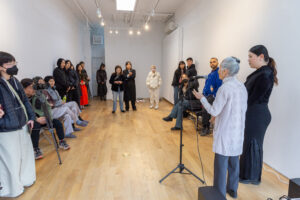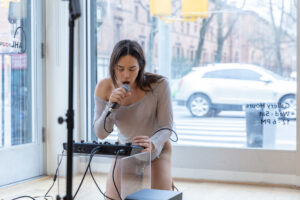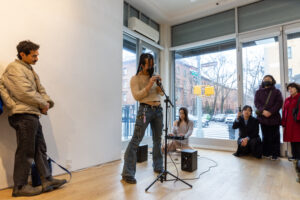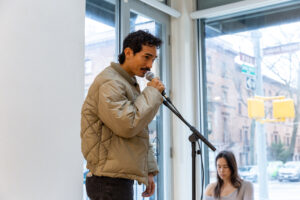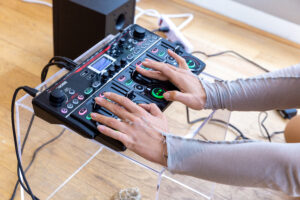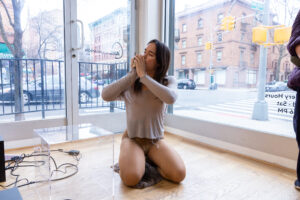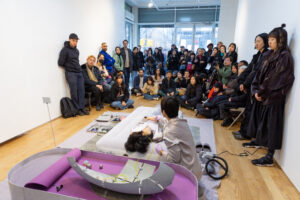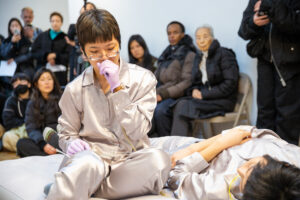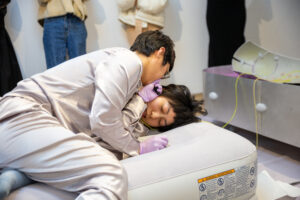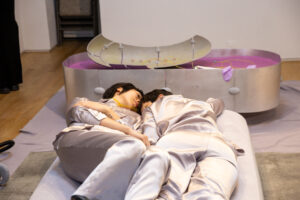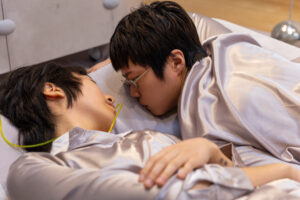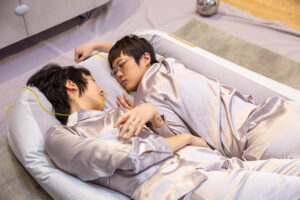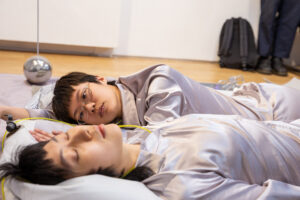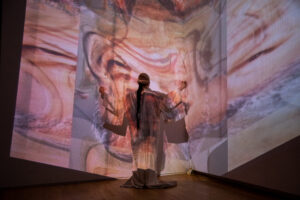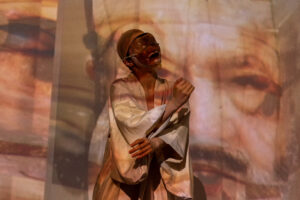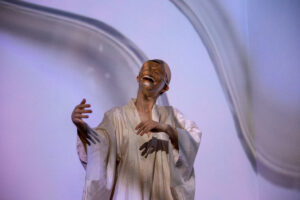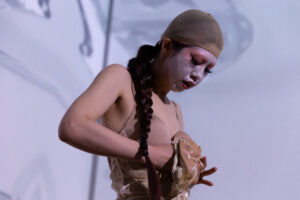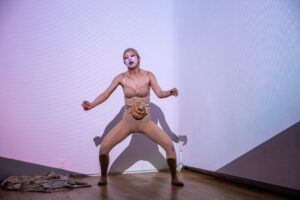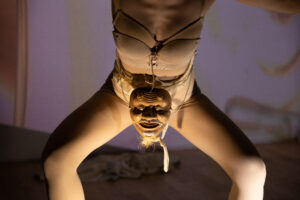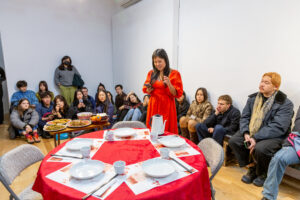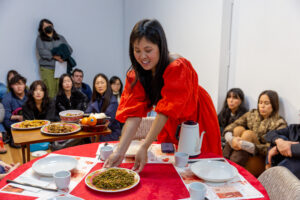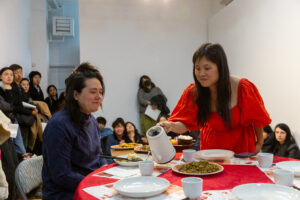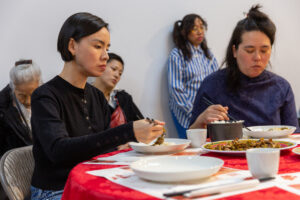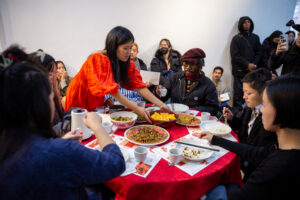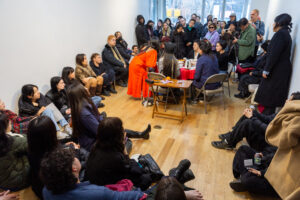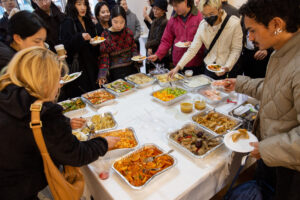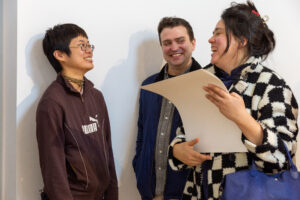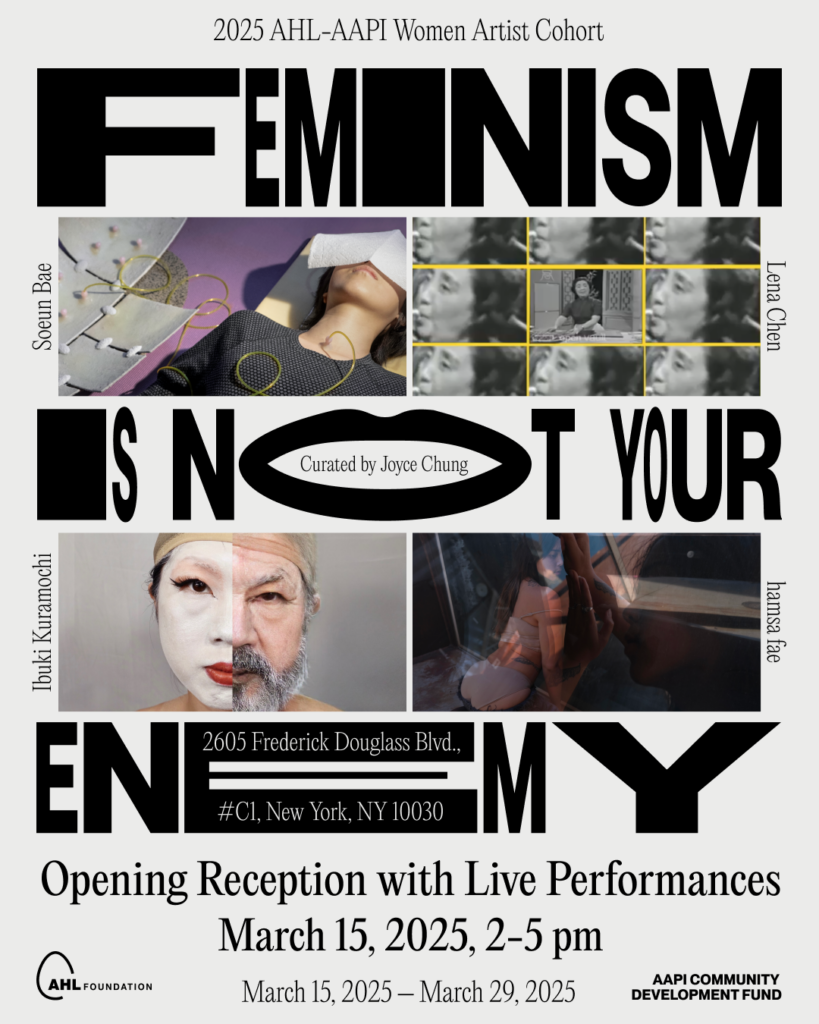
- Exhibition Dates: March 15–December 29, 2025
- Gallery Hours: Wed–Sat, 12 PM–6 PM
- Location: AHL Foundation Gallery (2605 Frederick Douglass Blvd. #C1, New York, NY 10030)
- Curator: Joyce Chung
- Participating Artists: Soeun Bae, Lena Chen, hamsa fae, Ibuki Kuramochi
- Opening Reception: March 15, 2025, 2 PM–5 PM
Curatorial Essay by Joyce Chung
Feminism Is Not Your Enemy is an urgent and timely exhibition that seeks to reclaim and reframe the narrative around feminism that is too often misunderstood, misrepresented, and weaponized. At its core, the exhibition challenges the reductive misconceptions that have created ideological rifts in our society, reasserting feminism not as a divisive force, but as a movement committed to equity, justice, and collective liberation.
Feminism is not monolithic. It encompasses a wide spectrum of thought that is liberal, socialist, and radical, each with its own distinct strategies and visions. This exhibition centers on intersectionality, a concept introduced by scholar Kimberlé Crenshaw, which acknowledges the overlapping and interconnected nature of social categorizations such as race, gender, and class. By focusing on the lived experiences of racialized women, particularly voices from AAPI communities, Feminism Is Not Your Enemy highlights the nuanced, multifaceted nature of oppression and resistance.
Through this lens, the exhibition becomes a celebration of resilience, agency, and transformative power. It honors women who defy restrictive roles, navigate layered identities, and use their voices and bodies to challenge systemic barriers. Their art is not only expressive; it is a form of activism, a call to reimagine society and assert that another way of being is possible.
Styled as a “women artists’ performance art festival,” the exhibition opens with four dynamic performances unfolding throughout the day, each one a sensorially disquieting and provocative encounter that embodies feminist resistance and radical care. From movement to sound, from silence to spectacle, these works speak to both personal histories and collective futures.
The opening performance of Feminism Is Not Your Enemy features a hauntingly evocative live vocal sound installation by hamsa fae, whose work offers an embodied meditation on the transfeminine experience. Drawing on ancestral sonic traditions of shamans and ritualists from the Asian Pacific, hamsa channels these spiritual vibrations through a contemporary, hyper-sensual lens, interrogating the social contracts inscribed onto the femme body and, more specifically, the femme voice.
The performance unfolds as both ritual and reckoning. Using her voice as the primary medium, hamsa traverses a wide spectrum of sounds from ethereal hums to guttural howls, each carefully modulated to disrupt normative expectations of gendered vocality. Her soundscape hovers between the sacred and the subversive, asking: What is a “girl voice”? Who gets to define it? Audience participation becomes a vital part of the experience. Viewers are invited to record themselves responding to the prompt: “How’s this for a girl’s voice?” hamsa then collects and layers these disparate recordings into a growing choral composition. The result is a chaotic yet strangely harmonic symphony—a wild, multi-voiced harmony that celebrates vocal multiplicity and defies binary constraints. This collaborative aspect of the work serves as a reclamation of voice in both the literal and metaphorical sense, with each layer adding texture to a collective cry for recognition, liberation, and presence.
Her bodily movements are as much a part of the piece as her voice. As she howls, growles, and sniffs, the space transforms. It feels as though the gallery became a living forest, one where instinct, intuition, and identity merge with nature’s raw energy. Her intent is to reconnect the human voice to land, to the grounding forces of nature, and to the cyclical processes of death, renewal, and regeneration.
Visually, the performance is equally arresting. Draped in a translucent veil of pale grey fabric, her body becomes a shifting silhouette, fragile and ethereal. As she wraps herself in mic wire, binding and unbinding, it evokes a surreal, almost mythic image: a figure caught between entanglement and emancipation. The wire, both a conduit of voice and a symbol of restraint, underscores the performance’s tension between visibility and silencing, connection and captivity.
hamsa fae’s piece is not just a performance. It is an invocation. It demands that we listen with more than our ears, to consider how voice and body are policed, fetishized, liberated, and reimagined. It leaves the audience suspended in a liminal space between the known and the wild, the human and the elemental.
The second performance of Feminism Is Not Your Enemy, conceived by multidisciplinary artist Soeun Bae, unfolds as an intimate yet uncanny encounter. The performance is a dreamlike sleepover experience that quietly unsettles and redefines the familiar dynamics of closeness. Set atop a subtly pulsating pumping air bed, the performance centers on the interactions between two female bodies in a shared space, revealing how intimacy is formed, strained, and restructured through both physical and emotional negotiations.
In this quietly potent tableau, the air bed becomes more than a resting place; it is a responsive, breathing surface that distorts with every movement, amplifying the subtle tensions between weight and lightness, support and surrender. The soundscape, consisting of a textured composition of experimental audio, shifts between ambient vibrations and mechanical murmurs, mirroring the push-pull of the bodies and their precarious movements between autonomy and attachment.
Beside the bed stands a table bearing a sculptural apparatus: an enigmatic, medical-industrial assemblage of clear hoses and tubing, connected directly to the performers’ bodies. These extensions—tethering the internal to the external, the organic to the artificial—functions as metaphoric veins, simultaneously evoking life support, emotional dependency, and the often-invisible systems that sustain bodies in relationship. The tubes create a kind of circulatory loop between the performers, where breath, sound, and movement flows back and forth in an eerie, symbiotic rhythm.
As the performers move, recline, and adjust on the shifting airbed, their gestures remain slow and deliberate. Yet within this softness is an undercurrent of unease. The performance dismantles any assumption of comfort by foregrounding the fragility and volatility of shared spaces, especially when constructed within systems that blur the line between care and control.
The piece becomes a live study of duality and division, public versus private, closeness versus separation, support versus suffocation. Soeun Bae’s work questions how bodies co-regulate within these boundaries, and what happens when those lines are intentionally collapsed or confused. It is a meditation on how the self is constantly formed and reformed through another, and how vulnerability is both a site of intimacy and potential rupture. In its totality, the performance is an evocative play of tension between softness and mechanism, surrender and resistance. It invites viewers to not only witness but to feel the delicacy of mutual existence, and to consider the emotional labor that intimacy demands, especially from women. It is, at once, an installation, a ritual, and a feminist provocation, redefining the bed not as a site of rest, but as a terrain of negotiation.
In the third performance of Feminism Is Not Your Enemy, Ibuki Kuramochi delivers a visceral, high-intensity but radically disrupted performance that draws on the traditions of Noh, the ancient Japanese theatrical form historically performed exclusively by men. Through a bold fusion of movement, projection, sound, and digital intervention, Kuramochi dissects the entangled legacies of patriarchy and cultural inheritance, positioning the female body as both subject and agent of transformation.
Rather than adhering to the slow, meditative pacing of traditional Noh, Kuramochi’s radical, dynamic movement rips through the performance space with force and urgency. Her gestures are erratic yet intentional, at times violent and eruptive as if physically breaking through the tightly constructed codes of tradition. In doing so, she unmasks the often invisible constraints placed on women’s bodies and identities under the guise of heritage.
Wearing a traditional Noh mask, Kuramochi’s face becomes a paradoxical site: both visible and hidden, timeless and politicized: an AI-generated masculinized version of her elderly self alongside the static, stoic faces of a traditional elderly man mask and a Japanese woman mask. This visual interplay fractures the linear narrative of aging and gender serving as a speculative embodiment of societal expectations around aging and masculinity.
Behind her, a series of projected video collages features a provocative, uncanny, and hyperreal juxtaposition. Also the performance space is thick with a volatile mix of harsh electronic distortion. This sonic and visual dissonance amplifies the sense of rupture and resistance, creating a space that was as overwhelming as it was immersive.
Kuramochi’s radical physicality, in combination with technological manipulation and ritual aesthetics, gestured toward a post-human image of femininity: one that defies categorization, resists cultural fossilization, and actively rewrites the scripts of womanhood. She weaponizes performance to fracture time, tradition, and gender, offering instead a volatile, generative space of becoming. In Feminism Is Not Your Enemy, Kuramochi’s performance functions as a call to reimagine lineage not as inheritance as well as as something to be interrupted, hacked, and made new through the body itself.
For the final performance of Feminism Is Not Your Enemy, Lena Chen transforms the gallery into a communal dining space, an intimate, radical act of gathering that blurs the lines between art, activism, and nourishment. In her participatory performance Five Flavors, Chen collaborates with local Asian American sex workers, including members of Red Canary Song, a Flushing-based coalition that advocates for the rights and safety of Asian and migrant massage parlor workers. Together, they prepare and serve five distinct dishes, each rich in cultural and emotional resonance.
The meal was not simply a gesture of hospitality. It was a community-based intervention into systems of exclusion and silencing, especially within mainstream feminist discourse. By bringing Asian American sex workers and audiences to the same table, Chen created a space where marginalized voices could not only be heard but nourished, honored, and centered. The performance reimagines the dining table not just as a site of consumption, but as a site of agency, storytelling, and solidarity.
Each dish represents a different facet of Asian American femme identity through flavor, texture, and presentation. They embodied the complexities of being both the one who consumes and the one consumed. Chen’s work delves deeply into this duality, addressing the ways in which Asian American and Pacific Islander (API) women are often objectified, fetishized, commodified, and racialized, and how this objectification produces deeply contradictory sensations of pleasure and pain, violence and intimacy, oppression and power.
By making food the central medium of exchange, Five Flavors drew on ancestral rituals, domestic practices, and feminist strategies to challenge the historical erasure of sex workers, especially in feminist spaces where their inclusion has often been contested. The act of preparing and sharing a meal together becomes a metaphor for the work of healing, resistance, and reclamation. Conversations unfold between bites, between strangers and kin, touching on personal histories, political struggles, and shared dreams. Chen’s approach to performance is one of embodied dialogue where nourishment is not only physical, but intellectual and emotional. In this setting, the gallery becomes a living, breathing space of connection and transformation. In this quietly revolutionary act of sharing food, Chen reminds us that feminism, at its most radical, begins with who we invite to the table and what we are willing to taste, hear, and hold.
After the performances, the gallery space itself becomes an archive featuring videos, sculptural elements, and sound installations derived from the live works. This continuation invites viewers into sustained engagement, transforming the gallery into a cross-disciplinary, participatory site of dialogue and reflection. Feminism Is Not Your Enemy asks viewers to reconsider what feminism could mean, to confront their own assumptions, and to embrace the possibility of solidarity across differences. The exhibition acts as a declaration, a celebration, and an invitation to listen, to learn, and to act.
About the Curator
Joyce Chung is the Curator at Asian Arts Initiative in Philadelphia, where she oversees the exhibition and performance program. Her curatorial projects focus on the complexity of identity and representation through the lens of the politics of place. Chung is also interested in artistic exploration of struggles and hardships that are often overlooked, such as those of ethnic and gender minorities, women, and immigrants. She previously worked at a number of museums and galleries both in Korea and the United States, including the National Museum of Modern and Contemporary Art, Korea, Hyundai Card, Kukje Gallery, as well as for the Gwangju Biennale and Performa, New York. Chung holds an MA in the Humanities with a concentration in Art History from the University of Chicago and a BA in Art History from Wesleyan University.
About the Artists

Soeun Bae, My Private Sleepover Service, 2025
Soeun Bae (b. South Korea) was raised in Alabama, and now based in New York. Bae works with sculpture, technology, and performance to question what it is to be living inside of a body. She participated in Wave Hill’s Sunroom Project, and completed residencies at Anderson Ranch Arts Center (CO), NARS Foundation (NY), and Velvetpark Media (NY). Bae completed her BFA in Sculpture from the Rhode Island School of Design in 2023.

Lena Chen, Mother of Whores, 2024
Lena Chen (b. 1987, San Francisco) explores care, intimacy, race, and gender through an artistic practice spanning performance, new media, and socially engaged art. Collaborating with communities including sex workers, reproductive health workers, and trauma survivors, she has exhibited, screened, and performed her work internationally. Awarded Mozilla Foundation’s Creative Media Award and Best Emerging Talent at B3 Biennial of the Moving Image, her art is in the collections of the Center for Art + Environment at the Nevada Museum of Art, the MUST Museo del territorio in Vimercate, Italy, and the University of California, Irvine. Currently pursuing a Ph.D. in performance studies at UC Berkeley, she earned a B.A. in sociology from Harvard University and a M.F.A. at the Carnegie Mellon School of Art.

hamsa fae, the wind was just like them, 2024
hamsa fae (b. Los Angeles) is a Vietnamese-French poet and contemporary artist whose work combines live performance with movement, sound, and everyday objects. With a decade of research in shamanism, she uses memory to dreamscape portals into ethereality — a third space for reclaiming cultural identities and cosmologies often unseen/unspoken. Her works socially engage audiences to remember the in-between and beyond.

Ibuki Kuramochi, HUMAN PERFORMER, 2022
Ibuki Kuramochi (b. Japan) is an interdisciplinary artist specializing in Butoh dance, performance, video, installation, and painting. Her work delves into the poetic physicality of Butoh and themes of metamorphosis, Womankind, and sexuality. Since 2016, she has trained with Yoshito Ohno at the renowned Kazuo Ohno Butoh Dance Studio. Kuramochi’s work has been exhibited internationally in New York, Los Angeles, Tokyo, Paris, and Rome, and she was featured as Artist of the Year in LA WEEKLY’s “People 2019.” She is a recipient of the 2024 City of Los Angeles Department of Cultural Affairs Performing Arts Division awards and the 2022 SCIART Ambassador Fellowship. Recent highlights include exhibitions at the Torrance Art Museum, PST Art and Science Collide presented by Getty, and Craiova Art Museum Romania, as well as lectures at art college in Tokyo and the NY Film Academy.
About the AHL-AAPI Women Artist Cohort
The AHL-AAPI Women Artist Cohort provides a platform for AAPI women artists to explore and address critical issues through their artistic practices. The selected artists will collaborate with curator Joyce Chung (Curator, Asian Art Initiatives), who will offer insights into their creative processes through studio visits, co-lead workshops, and curate the exhibition. Through development workshops, the artists will research each other’s practices, share their perspectives, and refine the works they will present in the exhibition. This program aims to support professional and creative growth while fostering meaningful public engagement with the artists’ work. The AHL-AAPI Women Artist Cohort program is made possible with support from the AAPI Community Development Fund (AAPI CDF).
You can view and download the exhibition catalog from the link:
For media inquiries, please contact: info@ahlfoundation.org

